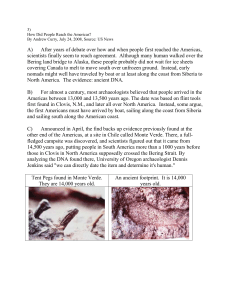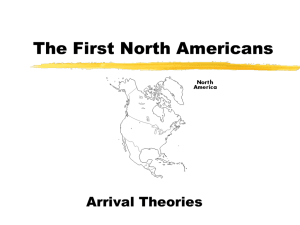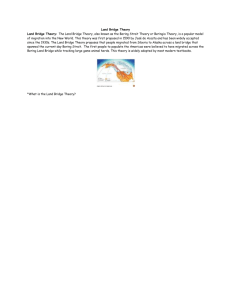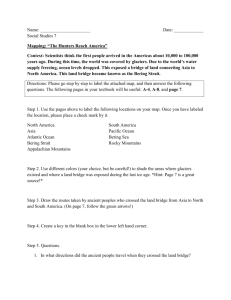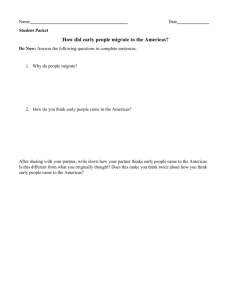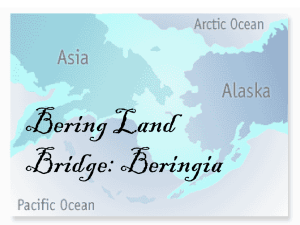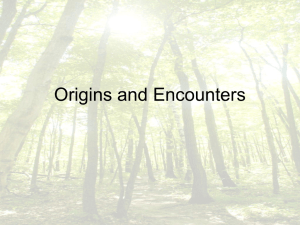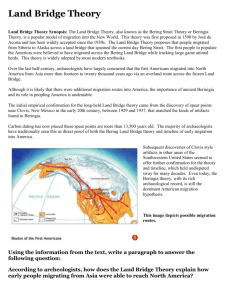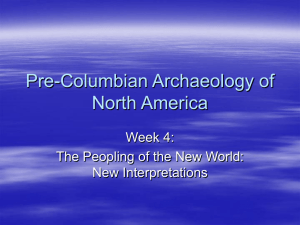Complete Wiki Review Form
advertisement
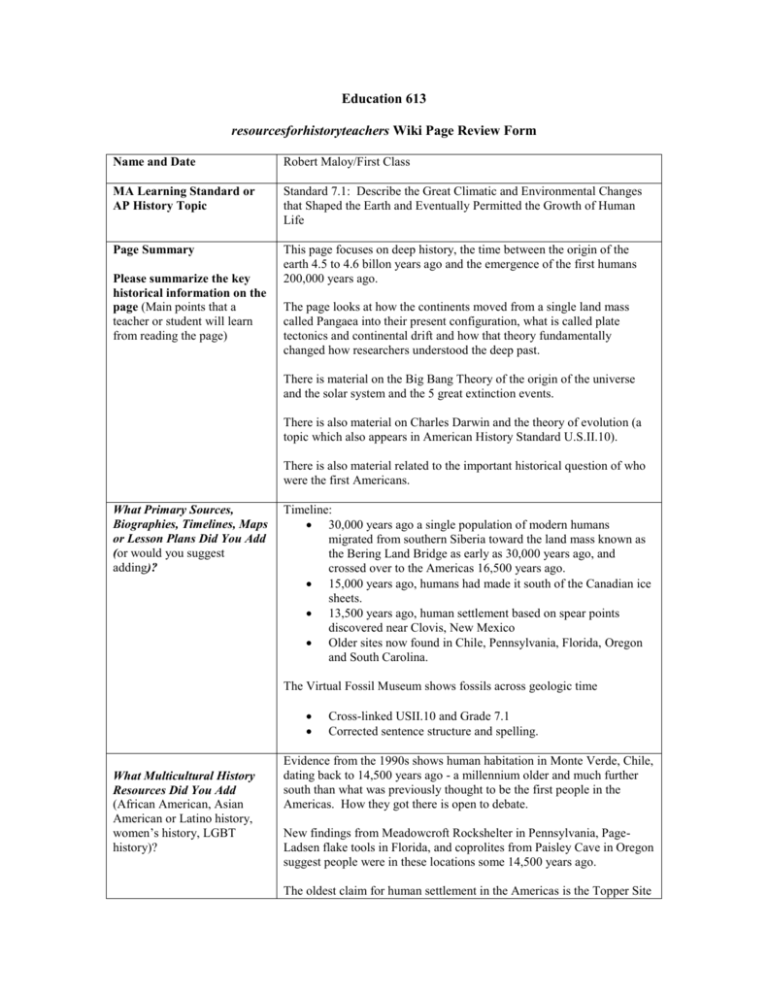
Education 613 resourcesforhistoryteachers Wiki Page Review Form Name and Date Robert Maloy/First Class MA Learning Standard or AP History Topic Standard 7.1: Describe the Great Climatic and Environmental Changes that Shaped the Earth and Eventually Permitted the Growth of Human Life Page Summary This page focuses on deep history, the time between the origin of the earth 4.5 to 4.6 billon years ago and the emergence of the first humans 200,000 years ago. Please summarize the key historical information on the page (Main points that a teacher or student will learn from reading the page) The page looks at how the continents moved from a single land mass called Pangaea into their present configuration, what is called plate tectonics and continental drift and how that theory fundamentally changed how researchers understood the deep past. There is material on the Big Bang Theory of the origin of the universe and the solar system and the 5 great extinction events. There is also material on Charles Darwin and the theory of evolution (a topic which also appears in American History Standard U.S.II.10). There is also material related to the important historical question of who were the first Americans. What Primary Sources, Biographies, Timelines, Maps or Lesson Plans Did You Add (or would you suggest adding)? Timeline: 30,000 years ago a single population of modern humans migrated from southern Siberia toward the land mass known as the Bering Land Bridge as early as 30,000 years ago, and crossed over to the Americas 16,500 years ago. 15,000 years ago, humans had made it south of the Canadian ice sheets. 13,500 years ago, human settlement based on spear points discovered near Clovis, New Mexico Older sites now found in Chile, Pennsylvania, Florida, Oregon and South Carolina. The Virtual Fossil Museum shows fossils across geologic time What Multicultural History Resources Did You Add (African American, Asian American or Latino history, women’s history, LGBT history)? Cross-linked USII.10 and Grade 7.1 Corrected sentence structure and spelling. Evidence from the 1990s shows human habitation in Monte Verde, Chile, dating back to 14,500 years ago - a millennium older and much further south than what was previously thought to be the first people in the Americas. How they got there is open to debate. New findings from Meadowcroft Rockshelter in Pennsylvania, PageLadsen flake tools in Florida, and coprolites from Paisley Cave in Oregon suggest people were in these locations some 14,500 years ago. The oldest claim for human settlement in the Americas is the Topper Site in South Carolina, dating back to about 15,000 years ago. I added material on The Bering Land Bridge Theory along with new evidence that disputes this long-held view. I added a subhead to the page for a section on the Peopling of the Americas and the multicultural history icon The Land Bridge theory proposes that people migrated from Siberia to Alaska across a land bridge that spanned the current day Bering Strait. The first people to populate the Americas were believed to have migrated across the Bering Land Bridge while tracking large game animal herds. Most textbooks cite this theory. I also added: “Theories about the Bering Strait” website from the Burke Museum (multicultural resource) “Canada’s First Nations: Migration Theories” website from the University of Calgary to Standard 7.2. Land Bridge Theory and Coastal Route Theory from the University of Texas Open Website Project What Multimedia Resources Did You Add? (writers and books, interactive websites, YouTube and other videos, learning games)? Personal Learning Please summarize what you have learned from working on the page (both new historical information or new ideas and materials for teaching history) Quiz Question There are plate tectonic animations that show the movement of the continents over time. A Solar System Simulator from NASA provides amazing views of planets, moons, and other bodies in space. Added a picture of Charles Darwin Added icons for lesson plans, historical biography, and multicultural resources. Deep history involves the time between the origin of the earth and the emergence of the first humans. New evidence raises questions about Bering Land Bridge as the sole source for the peopling of the Americas. The 5 Great Extinction Events. NASA images of the planets gave me new information about the solar system. Scholars agree that the peopling of the Americas happened sometime in the past 25,000 years. The oldest settlements may have been at which of the following locations. a) Monte Verde, Chile b) Paisley Caves, Oregon c) Piaui, Brazil [correct] d) Clovis, New Mexico Feedback: Unearthed stone tools suggest humans reached northeast Brazil as early as 22,000 years ago, even earlier than Monte Verde, Chile (14,800 years ago) and some 10,000 years before remains found in Clovis, New Mexico or Paisley Caves, Oregon.
